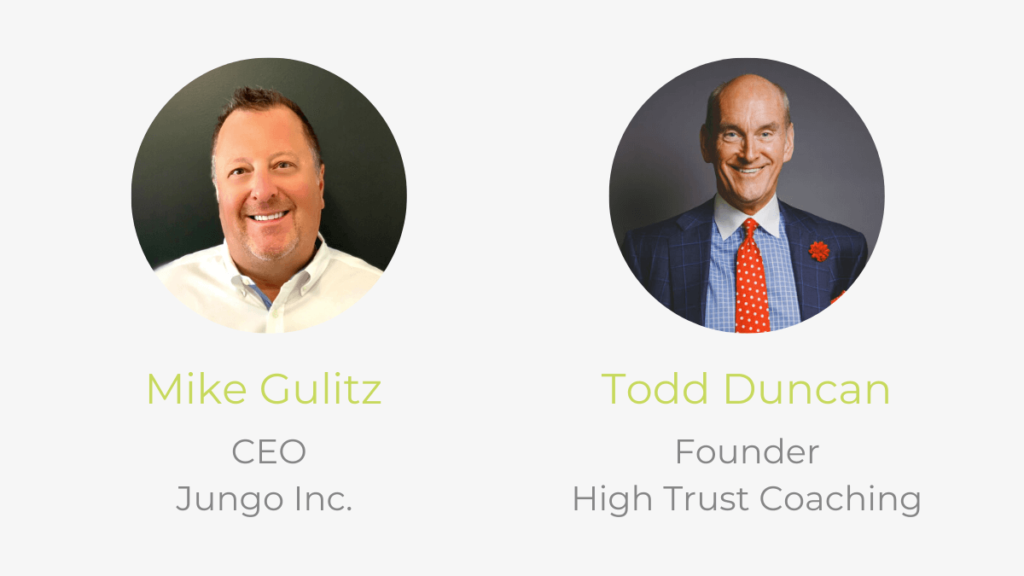
The coach to top producers, and founder of High Trust Sales Academy, Todd Duncan, recently chatted with Mike Gulitz, CEO and co-founder of Jungo. They covered everything from why you need to connect to your realtor partners now more than ever, to how to support your borrowers during this uncertain time.

Listen to the full Todd Duncan interview now!
Read The Full Todd Duncan Interview Now
Mike Gulitz: Welcome everybody. I’d like to thank you for attending Top Producer Hacks for Getting It All Done with Todd Duncan, our guest today on the broadcast.
Introducing Todd Duncan
Todd is a longtime friend and a partner of Jungo and we are very excited to have a conversation today with our dear friend. We want to welcome each one of you to the podcast, and we would encourage you to stick around, because we’ve got something special at the end of the podcast.
Jungo is going to offer you a nice little freebie, and Todd has a special offer that he’s created just for this particular situation. So I hope you’ll be able to stick around. Todd Duncan, the legend, welcome to the broadcast.
Todd Duncan: It’s good to see you, Mike. You know all things considered, we’re both smiling and you can feel the energy. I’m excited that we get to spend some time chatting–I always appreciate you. I appreciate Jungo, I appreciate the relationship you have with your tribe, and I’ve always admired what you guys are doing to add value for people.
Opportunity to Share
Certainly, I hope that out of this comes some opportunities for somebody that’s a part of your tribe to really take our message and our conversation and share it with their clients and referral partners. There’s a lot of need right now for us to connect as a society, and no doubt we have new ways to do it. I’m excited about our time. Thank you.

A “New Normal”
MG: Outstanding. I want to jump right into some topics for us, because the more we’ve been spending time with our clients and really getting into the minutia of what’s going on right now with our new normal, a lot of really good questions have come up. I thought it would be an appropriate time as we’re talking about reopening parts of the country, to talk about the mortgage industry, and what this new normal has meant to your loan officer clients, my loan officer clients and their teams and partners. And the industry as a whole.
I don’t have a crystal ball and I know you don’t either, but what are we seeing out there? So that we can bring some ideas and some best practices to those folks that are, you know, scratching their head right now saying, “What’s going to happen next week?”
TD: Yes, but just to make it really clear, I do have a crystal ball. It just isn’t working right now. Well, it’s foggy and it’s not quite resonating right now.
How You Handle Unexpected Events
The first thing that I’m seeing is really a foundational truth, Mike, that’s coming out. It has to do with how we interpret the realities of what we’re involved in, right?
Nobody knew 38 days ago that we would be where we are right now. Nobody even thought, 75 days ago, that 24 million Americans would be unemployed. Nobody even understood lockdown and what that actually meant.
So we got pretty much forced into something that nobody saw coming. I think that is probably the challenge. What happens when stuff happens that you’re not planning on happening?
Your Response Defines Your Success
It starts with response, right? You and I were chatting before we went live, and there’s this word out there that I think people really need to understand. It’s in the toughest times, the darkest moments, the periods of uncertainty that the human spirit really has an opportunity to rise. As hard as that is to get your head around, we have a choice. Every person that’s listening to this, every person that wakes up every day has a choice that day to adopt the attitude that they’re going to have for that day.
It is so easy right now to go dark. It is so easy to go negative. We’ve got bulging pipelines, we’ve got borrowers that lose their jobs for funding. We have agents that aren’t selling property. We have all these things that are this kind of domino effect.
We have to control the only thing we can control, which is our attitude. Chuck Swindoll said a long time ago, he said, “90% of life is what happens to us, but 10% of life is how we respond to that 90%.” And it’s the 10% that makes the 90% becomes something that helps us elevate, innovate. We’re doing things today as a society. Every one of your tribe members, everybody that’s in Jungo and High Trust believes in what we do for a living. I mean everybody is getting challenged. So human spirit is 100% necessary right now in how we respond. As simple as it sounds, as hard as it is to adopt that attitude.

Staying Connected
MG: Let’s break this down a little bit. How has your company been staying connected while working remote?
TD: We call our best friends and offer to do webinars like this. I mean, that’s one way. I’ve got 28 companies on my board over here that we want to just jump on and help their community win. So that’s one of the ways we’re doing it.
Mindset Moments
Another thing we’re doing is that I started posting what are called Mindset Moments on our social media platforms. The desire was to send a message out every day that helped people think about mindset.
I don’t have a schedule on what I’m going to talk about. I mean this morning, I was on my way to the office, and I pulled over next to the beach, which has orange cones everywhere and caution signs that you can’t go to the beach. I recorded a mindset moment this morning on the whole idea of gratitude and hope.
I’m also trying to reach out to five decision makers a day on FaceTime. I don’t do it with texts. I try to connect in the most human way possible.
We’re launching a program that’s specific to the next four months, a resource that we’re going to be doing on Zoom and Facebook Live to just pour into agents and lenders and help them win.
Event Cancellations
I think it’s interesting that when you’re in the events business, and events are shut down and there’s no light at the end of the tunnel when we can eventually come back. Nobody knows. We’ve had to cancel two events. We’ve had 12 events cancelled on us.
When you’re an events company and you can’t do events, you have got to figure out other ways to connect. And so that’s what we’re doing. Everybody is connecting at different levels and using technology to do it. How about you? What are you guys doing?

Jungo’s Approach
MG: Yes, I can speak to what we’re doing at a high level with the management team. We changed our operating system and how we run the company. Two years ago, after I read a book by Gino Wickman called Traction, we hired this entrepreneurial operating system consultant to come in and teach us how to run our company using the techniques with Traction.
That’s transformed how we efficiently address the issues that are most important. So that’s been probably the cornerstone of why we’ve been able to transition successfully.
A Cloud-Based Company
The second thing we’ve done is because I’ve been a long-time cloud supporter-we were one of the first apps in the Salesforce environment-we were able to move our team from the office to completely remote within three days. The entire team transitioned, I think the only person that still goes into the office is Juliana occasionally to print documents.
By being able to do that and still be able to maintain our caseload, we’ve been able to support our clients. So what we’ve tried to do is just lead by example. If we can transition from corporate offices where we’re always together, to home offices like the loan officers are, then we’re still able to provide the technology they need. So, they don’t lose any time, they don’t have any downtime. That’s been huge.
Human Connections
The third thing that we’ve done is what you just talked about. We just did our company meeting on Friday, and to get to see all those beautiful faces for the first time in about four weeks, because we transitioned the first week of this. So we’ve all been working now from home since the middle of March.
During the meeting, being able to see them, we spent the first 15 or 20 minutes of the company meeting going one by one and asking them, “What are you binge watching,” “Have you picked up any new hobbies?” “How are you filling the time?” “What have you learned about yourself?”
We just got to see them talk, and it almost felt like the connection was more real, because we’re also hungry for those connections right now, which I know is a big theme for you. I would say those are probably the three things that are the most impactful for Jungo right now.
TD: Okay. So a moment of vulnerability. What are you binge watching?
MG: Oh, this is going to get me in trouble. I’ve never seen “Naked and Afraid,” and man, I’ll tell you, you watch about an hour of that, and you don’t feel so bad about being locked in your house!
TD: That is so right.
Changing Communication
It’s interesting that my go-to person in our company that runs operations, I mean literally she’s normally 18 feet from my desk, but now she’s 21 miles away. It’s so different to figure out–how do I connect with her now, versus how did we connect when we could just be face to face?
I think it’s forcing a whole new kind of innovation. Deb’s birthday was last Wednesday and we had a birthday party on Zoom. We had gifts, we had a birthday cake that Deb got to blow out candles on, and we had like 18 people on a Zoom call having a birthday party. I could have never predicted that that would happen.
My mom is 87 years old. Bless her heart, she knows how to FaceTime. But instead of realizing the camera’s up here, she thinks the camera’s down in the home button. So she’s always looking down here and all you see is from her eyebrows up. Bless her heart. But my 87 year old mom is connecting on FaceTime.
MG: That’s good for her. Happy belated birthday, to Deb too.
TD: Thank you.

High Trust Coaching
MG: Along those lines, what are you finding that’s working to keep you in touch with your clients? Because there’s so many different levels to High Trust. You have your books that you’ve written over the last several decades.
You’ve got the most amazing events for the mortgage industry, going on 26, 27 years running with Sales Mastery. But how are you connecting with that core group of coaching clients right now?
Because I can only imagine that they’re facing some of the biggest challenges with teams and communication and going from all this volume to whatever they’re dealing with now. How are you connecting with them?
TD: The interesting thing about the coaching company is it is absolutely private. You know, first of all, you’ve got mortgage bankers that are making more money this year than they’ve ever made. They have more challenges than they’ve ever had.
So we’re watching High Trust Coaching just scale and anybody that’s in Jungo can go to hightrustcoaching.com, and click on the free coaching consultation and talk with one of our coaches and see if there’s value there.
We have 18 coaches and they’re coaching every single day. Our coaching members are thriving. What we’ve done is we’ve stepped up the length of our coaching calls and we have also stepped up the invitation to our coaching members who have teams to join on demand if they have a team issue they need to work through.
Following Best Practices
TD: But at the end of the day, what we’re trying to do, keep everybody centered on the principles and the laws that we know work today. It’s always a deeper level of trust when you can have an in-person face to face conversation. But, that’s impossible right now. So how do we use technology to still create trust, and what are the new methodologies and the new questions and the new dialogues that we’re having, to be able to facilitate a face to face relationship?
Planning for the Future
TD: What’s happening to the coaching members is that they are revamping business plans. They’re not taking their plan down. They’re taking it up cause everybody’s ahead of volume. They’re reorganizing team structures and identifying new ways to communicate as a team. They’ve stepped up the amount of huddles they have per day from a huddle in the morning and a huddle in the afternoon, to four huddles a day.
Because when you’re disconnected, you have to figure out how to connect more consistently. Or we’re going to jeopardize the consumer experience, right?

Referral Market
The other thing that they’re doing right now, is imagine this for a second–your core referral market is hurting, right? You look at Redfin laying off 42% of it’s staff. Zillow having a reduction, PurpleBricks having a reduction. You look at ibuyers that has kind of dried up.
People are unemployed. 401ks are getting hit by 30% or 40%. There are people that were going to buy a home 70 days ago that are not going to buy a home now. And so our core market is hurting. In the midst of the vortex of refinances, which is 65% to 80% of most LOs pipelines right now. The reality is that the purchase business is there, but it’s not as robust as it was for the reasons I just mentioned. We need to figure out how to connect with our referral partners in deeper ways to help stimulate future business.
Because here’s the drill. 120 days is going to be here before you know it, and what nobody in our tribes wants is to wait 120 days to figure out what to do. So the only thing we can count on is connection.
Staying In Touch with Agents
What I would do if I were a loan originator is, depending on how many agents I have, I would have a business planning meeting with every agent every two weeks. But you can’t do that if you have a hundred agents.
If you’ve got a key group of 10 or 15 core agents you can call them every two weeks. Tell them, let’s talk every two weeks for 20 minutes. Let’s just schedule 12 weeks. I’ll send you an invite right now and we’ll start it this Tuesday.
We’ll do it every other week for 12 weeks and I’m just going to connect with you, and all I want to do is have conversation so that when everything changes, we don’t have to figure out what we’re going to do.
Then we’ve already figured it out, and we’ll be that far that much further ahead when everything changes. Yes, nobody knows when this is going to end, but we know it’s going to end, so you don’t want to wait until then to figure out what to do.
You want to do it now because nobody is doing it right now. If you want an unfettered marketing territory, it’s right now. Reconnect with real estate agents because there’s not a lender in town who is actually working the agent market like they need to.
Then, later on, Mike, I want to talk about Jungo and databases because I think there’s a whole new migration there as well in terms of what savvy lenders are doing to insulate themselves from the gyrations of the purchase market.
MG: You know, I wanted to talk to you about your concept of the three crucial decisions. What best practices are you recommending to loan officers right now?
The Psychology of Fear
TD: At some level Mike, everybody is hurting, right? At some level everybody is hurting. And at some level there is uncertainty. I’m doing a lot of work right now on the psychology of fear as I study. What our coaches do is I study what high performance actually looks like. Even when you look at the annals of history and even the modern day Musks and Bransons and Bezos, you know, at some level everybody has fear.
The question is what emotion do you assign to fear?
False Experience Appearing Real
You can take that word, which is four letters, FEAR, and you can worry. That acronym is False Experiences Appearing Real.
Whatever we’re thinking might happen, chances are it’s not going to happen. Yet if we’re in that mindset, we are frozen, we are paralyzed and we don’t want to do what we fear, which means there is no advancement.

Face Everything And Rise
91% of what Americans worry about rarely if ever comes to fruition. 9% of what we worry about is real and the rest we make up in our head. Fear could also stand for Face Everything And Rise, because if it’s fear, I can either be overwhelmed by it or I can be empowered by it. I can be disempowered, which is negative. Or, I can be empowered, which is positive.
So, whatever happens, it is happening. Whatever’s going to happen is going to happen and there’s so much that you and I can’t control. We don’t control any of the interest rate markets. We don’t control any of the operational expenses from our companies. We don’t control the vulnerability that owners have with margin calls. We don’t control society. We don’t control layoffs, we don’t control unemployment. We control none of that.
What we control is how we respond to the market and how we respond to the moments and how we respond to whether or not this is going to stop me or inspire me. How about this? How about understanding that throughout history, thousands of years, hundreds of years, a couple of decades, 10 years ago, every challenge in business has created a breakthrough for the people that think positively about it.
So fear then becomes feeling excited and ready. How do I go from False Experiences Appearing Real to here. “Hey man, I am fired up. I am excited. I am ready to make a difference.”
Three Places to Make a Difference
There are three places people need to make a difference. They need to make a difference in helping their clients win. They need to make a difference solving their client’s biggest problems. And they need to make a difference engaging at a deeper emotional level. Those three things, if you can help people win, if you can solve their challenges by asking new questions that you’ve never asked before, and if you can engage at a deeper level, heart to heart instead of head to head, then you’re going to win.
And we can do it on technology. I mean, I can’t feel your heat, I can’t feel your pulse, I can’t feel the energy, but I can see it. You can feel my energy right now, but I’m in an office that seats 25 people and I’m here by myself. But I’m still trying to communicate the passion that clients need to hear. Just like you, just like your LOs, you need to be excited in tough times because this is not going to last.
Long-Term Changes
We’re going to get through it and there’s going to be a new normal that’s going to become the way that we play this business period. And then we’re going to return to normalcy on stuff. I mean, we’re never going to be able to replace the live concert experience with a Facebook live stream. But it’s happening right now. So we’ll go back. There’s parts of the mortgage business we won’t go back on. We’ve learned some efficiencies. I think, haven’t we?
MG: I don’t know. I would definitely say so. I mean, just learn over the last month, we learned so much about Jungo operating efficiently. There is something that we had talked about in our disaster planning: what will we need to do? Worst case scenario, could we do this? But we never did it.
This wasn’t a dry run, this was our, “Okay, let’s do this.” To see the managers rise to the occasion and get everybody up and running. Our main concern was to be able to logistically answer the phone to be able to help our clients. To be able to help them with password resets or whatever their problem might be.
Okay, let’s shift gears from fear. What are people doing to keep their spirits up?
And I have a lot of respect for fear because I look at fear as a necessity. It’s what flips on when you’re a cave man and you’re getting hunted by a tiger, you need your tree. So I figure it has a place. I’m using my “Naked and Afraid” references too much.
But too much fear is dangerous. That’s what we’re kind of seeing right now, that people are concerned about, is staying in a fear mindset that puts stress on the body. It hurts us.
Keeping Spirits High
What are people doing to get out of the fear and keep their spirits up? I know we’re seeing stuff on television. What are you hearing as you talk to your clients and they’ve got this new normal, what are they doing to keep their teams and their clients and their partners spirits up?
TD: I wish I had all the answers to that question because I quite honestly am no different than anybody watching our conversation right now. We’re figuring it out as we go as well, right? We’re all trying to to make the best of difficult times, which is in essence, I think the value and the gift of difficult times.
I think for us, we’re keeping hope alive, right? And hope is the greatest strategy there is to get through difficult times. The only thing that might come close to hope is strategy. But if you don’t hope you’re not going to create strategy.
Perspective is Everything
I think that what has to happen is we need to have a different perspective. I did a Mindset Moment recently. I have about 7,000 acres behind my home in Laguna Beach. It’s wildlife and there are paths and everything. I was going for a walk and I watched a hawk, it was circling over my head probably 200 feet over where I was, and I was just watching the hawk and all of a sudden I saw the hawk go like this, down to the ground. It disappeared behind the shrubs, came back up and had a rabbit in its talons. And I’m thinking, what would I rather be? The bawk or the rabbit?
I do this mindset moment and I’m talking about perspective. The hawk is up here, right? The hawk is not down in the weeds, not down in the bushes. The rabbit can’t see two feet in front of it and it’s not looking up, but the hawk can see acres.
So the hawk decides, let me have perspective, let me get higher. So I can see where the opportunities are. I think that’s the key right now: separate yourself from being in the hole, being down on the ground, slugging it out, and just fighting. It’s about kind of rising up a little bit, take a a look and let me look at how I can best attack with value, with resources, with ideas. It struck me that we are so close to a problem sometimes that we can’t see the solution.
Be Strategic with Your Schedule
That’s why we need to kind of peel away and have a really good personal kind of head space and time. We’ve got to keep our energy alive. To the extent you can go out and work out, work out, get fresh air, try to try to break the monotony.
Really get back to the time blocking in your family unit. If you’ve got kids at home, you’re juggling balls, you’re juggling homeschooling, you’re juggling all that kind of stuff. But you still have to use time blocking as a methodology even while you’re at home.
You still need to do business, right? And you’ve got to do it in a loving way because now your family watches you operate. That’s kind of a challenge. How do you move from the fear of a rabbit? He doesn’t know what’s coming. To the face of a hawk knowing that if it’s patient enough, it’s going to find out what it needs. You have to understand faith and faith is just about: I’m going to have the confidence that we’re going to get through this.
A Proactive Mindset
MG: You know you touched on something that made me think about the psychology of being in a reactive state versus being in a proactive state. I love the fact that you are working with your clients to say, “We’re not going to hunker down and see what happens to us. If worst case scenario, we’re going to eventually run out of refinance business, how do we plan?”
The minute you start planning strategy, you are automatically in proactive mode. If that can be done, it’ll change your mindset. If you can be that resource for your realtor partner and help them, if their business has dried up. Can you imagine trying to be a realtor in New York City today?
If they’re on the sidelines and they’ve gotten themselves into a place where they’re realizing, “Oh my gosh, I’m just reacting.” If as the loan officer you’re sitting down and doing this 10 or 12 week plan of planning a strategy, that automatically puts them into a proactive state.

Deciding Our Future
TD: It’s not only proactive, but it’s the reality of response, right? I am a firm believer, Mike, that no matter where we are, we have two choices. We can either become part of what’s happening, or we can decide what we want to have happen. The interesting thing is if we think counter-intuitively, think counter culturally, we rise above. I can’t wait to watch Million Dollar Listing New York next year, and just see what these guys did during this time to keep their business going. Because we do know that people are buying. We do know that people are selling. We just have a lot of noise that’s getting in between how we get to that market.
Fight or Flight
That’s why I sat down the other night and I turned my phone on and I recorded 25 private video messages to 25 CEOs. I just did it right then, and I sent them out, and it was amazing to see the response that I got from guys and gals running companies that are in the same place. I am running a company and in the same place. You are running a company. Nobody is insulated from this. Nobody.
The human spirit is, I’m going to survive–using the caveman example, right? We are going to trigger ourselves into either fight or flight. That’s it. Don’t run from it. It doesn’t mean it’s not going to be bloody. It doesn’t mean it’s not going to be hard. It doesn’t mean that it’s not going to hurt a little bit. But that’s what innovation is. Innovation requires massive appetites for failure and figuring out how it doesn’t work before you ever figure out how it’s going to work.
I’m in the event business, Mike. I don’t know if we’ll ever go back to live. I’m counting on live coming back. But the innovation right now is that I can live stream anything I want. I can get anybody to join me. Even though you don’t get the energy of the live experience, you get the experience of the content. Just like you and I are doing an hour long conversation. You could be sitting right here, and if you were, you’d feel our energy, but it’s not gonna change the fact that you’re going to get the content. It all comes down to faith versus fear.
MG: I hear you.
TD: You know, feed your faith, starve your fear, feed your faith, starve your fear.
Face-to-Face to Virtual
MG: How are your clients dealing with limited in person meetings? We’ve talking about how we’re trying to do it with our businesses, but what’s the new normal for a loan officer that likes to press the flesh, that likes to do coffee meetings with the realtor partners and have that familiar touch? What are you seeing and what are they saying about going digital or going to this new normal and the technical side of the business showings and document signings? You can’t have people coming into your home and you can’t have documents going to government offices that are shut down.
What are some creative things that you’re hearing that people are trying or that people are succeeding with?
Follow The Rules
TD: I have a group of agents that I work with in Australia. I do a lot of work in Australia and I spoke to 40,000 realtors in June of last year. It was really interesting, I saw an Instagram post the other day from a guy named Alex Minton, who is a really, really big producer in Australia. He and three people from his appraisal team and inspection team were actually in a home, and they took a picture. I guess the government masks are orange, so every realtor had on an orange masks and they had on the purple gloves and they were in the property doing their inspection.
So, part of it is to go with the rules. To the extent that you can, do what you need to do, and go with the rules.
Thinking Creatively
But also, how do you have an open house right now? How do I get people excited about a property if I have a listing and how do I drive interest? Well, you better be using 3D virtual tours. You better look at the companies that are out there. If you have anybody go into a property, they’re going to go in with a mask. They’re going to go in with gloves.
It’s like the new level of appraisals. Instead of doing a physical appraisal, these guys are going in with drones and cameras and they’re creating virtual open houses. I got an email yesterday from my agent in Las Vegas and he had a two and a half million dollar property. And I could not believe how I could sit right here and I can click play and I could watch this virtual tour.
Then there’s an actual floor plan that is now virtual. So you can click master bedroom, and it takes you into the master bedroom, you can click master bath, it takes you into the master bath. You can click cabana and pool, and it takes you into the backyard. So all we have to do is use the tools that are coming out of innovation to continue to do the business.
Connecting with Borrowers
How’s a loan officer and a borrower couple doing it? The same way we’ve always done it. It’s just we’ve got distance between us, but we can still see each other. Have lots of consultations on Zoom–lots of conversations using embedded technology. I mean, we could have a PowerPoint going right below here. We could have a video presentation going right below here on product recommendations. We could do anything.
MG: If you imagine what it would be like right now without the tools of the internet–
TD: You couldn’t do it–it’d be, it’d be cowboy town. We’d die. You’d have tumble weeds blowing through the industry.
MG: There’s the gratitude part, right?
TD: 100%. So Mike, what do you see on that subject? What are Jungo power users doing? What are they doing to stay connected right now?

Becoming a Member of Your Community
MG: I’m hearing more and more about loan officers that are, if they’re not able to do transactions with their contacts or they’re not able to do business, the opportunity is to claim a stake and become more of a community member.
The conversations three months ago when they called might’ve been, “Hey, can I send you some information on annual equity review?” Now, they might be calling them up and saying, “How are you and the family doing at home? Is there anything I can do for you?” If they know that they have someone in their family who is immunocompromised, some clients are being a resource. They are doing something thoughtful like dropping off groceries. It’s a great way to really lay that relationship.
It’s a huge opportunity to transition from being just a trusted advisor, to being that community person, that friend that I never knew I could expect to depend upon.
Focusing on Friendships
I’ve been really close to Jeremy Forcier for years and years and I have access to thousands of loan officers just like you do. But if you would ask me if I would do a loan with anybody else, the answer is definitively no. That’s because he’s not just a guy that treats me like a transaction. He’s the guy that has been there for me through a divorce. He’s been there for me when I had the struggles of buying a dream home. I’ve spent family vacations with this person. That’s a guy that when you go to one of his events, there are 250 people at a baseball game and they all think they’re one of his best friends because he treats people like they are.
If you have that opportunity to turn lemons into lemonade, this is the time to reach out to people and show that heart and focus more attention on that side of the person that you are.
The Most Human Company Wins
TD: It’s really interesting that you bring that up, because I just got a case of books from a guy named Mark Schaefer. The book is called Marketing Rebellion. The subtitle on the book is “the most human company wins.”
I think what you’re talking about right now is that Jeremy is a very likable guy that has an incredible energy around helping people win. That’s the mindset right now that I don’t believe this industry can ever go back from. Here’s what I mean by that. There’s a study that just came out from a Deloitte and they’re talking about how trust and technology need to be so married up that what comes out of it is not the technology but the humanity.
So from my vantage point, the reason why I’ve spent about 140 hours on–this was part of an answer to an earlier question–but why I’ve spent 140 hours creating a resource called Connect is because I want to have people understand that the most human salesperson wins. The idea of empathy, the idea of humanity, the idea of connecting, the idea of solutioning, adding value. The idea that what you need to do, especially now, but also for the rest of your life, is figure out how to connect at a deeper level by asking different questions, having different approaches. Taking the spotlight off of you, putting it on the client. Helping the client win and crying and hugging and feeling the emotional connection and it’s way beyond the touchy feel. It’s not strategy. I’m not going to wake up every day and and say what is my strategy to have more humanity?
The Impact of Bad Technology
But I think in the world in which we live, like Stratmor just came out with something on their MortgageSAT about three weeks ago. It had three different ratings on technology and the difference between a high net promoter score and a negative net promoter score and the biggest delta they found was 134 points. Meaning they’re in negative territory if technology wasn’t answering with ease the questions clients would have.
It had this massive impact on the whole customer satisfaction. Was it attractive? Was it even appealing? I mean every one of the disparities was over a hundred points, meaning you would go from a nine or 10 which was somebody who was a promoter, to a negative 30. We’re not even talking about an detractor anymore. We’re talking about somebody who’s going to negatively pollute your brand.

Technology’s Power
People need to understand that technology is here, it’s not going anywhere, but bad technology is worse than no technology because I can still do the job. Like I had a Zoom meeting with my doctor the other day. How do you have a doctor appointment on Zoom? Well to start it off, he said “take your blood pressure.” I’ll put my blood pressure cuff on, I take my blood pressure, you know, we wait like 40 seconds. I get my blood pressure, I turned the screen around and say, there you go. And then we started talking about just a few of the things going on.
Then for a half an hour, he took off his doctor hat and we had a conversation about being dads and trying to turn out great boys.
Humanity Wins
Humanity wins all the time. Technology that’s good behind humanity makes it win even more. I’m just telling you right now, I think the most human people win. I think caring and empathy, sensitivity, vulnerability, transparency win. I think all those are winning combinations today.
MG: I know you have developed this new, exciting product called Connect, that’s going to be hyper relevant for the next few months. I want to go ahead and tell everybody about the URL so they can get it jotted down in case folks start leaving the call a little bit early. You can go to hightrust.com/connect and Todd’s given the Jungo tribe 10% off retail for this. So if you want to use that promo, of course you should.
Todd, can you talk a little bit about Connect so the audience knows what you’re offering them today?
High Trust Connect
TD: Yes, thank you for that. I’ve got about a $100,000 recording studio right behind me. I’ve spent about 120 hours writing what I think is the most relevant content for a new economy that I could ever write. We created a 120 day window where we’re going to drop 16 different learning videos on Mondays, Wednesdays and Fridays. The video sessions are all about the new world in which we find ourselves living. It’s all about, how do you connect first with yourself? Some of us are so busy that we’re losing our own personal connection. What are we doing with us, right? How do we then watch our connection with our human spirit and our values and the things that we really want to have as part of our success DNA really come back to life?
Then how does that extend out into using tough times to navigate a better future? These 16 videos are not longer than an hour and most are about 30 to 40 minutes. It’s brand new content that I’ve never delivered before. After 120 days, I’ll probably not deliver it again. It is for this season right now.
Then we get into what are the productivity habits of the hyper performers today in a society in which everything’s changed? What does that look like? What are people doing, how are they doing that? Then we go into what is the future of the one to one business relationship and the B2B business relationship.
16 videos, 20 playbooks that support the 16 videos. After the six weeks of videos are done, which you can watch on-demand and learn at your own pace, we’re going to do 10 live weekly, up to 90 minutes, coaching sessions with the Connect community. We’re going to have the social conversations around how people are connecting today in the new society.
It’s brand new content, brand new, and I’m very proud of it. It’s about laying the groundwork to have a defining moment in your life and your career that you’ll never retreat from. It is leveling up in ways that the world is not really espousing too. So that’s what we’re doing.
It’s $450, and you guys get 45 bucks off that. It works out to three bucks a day, for 120 days, and it’s the best thing I’ve ever done. Thanks, Mike.
What You Should Be Telling Your Borrowers
MG: Well we appreciate you, Todd. Getting back to some more of this conversation, what do you think the message should be for the loan officers to their clients?
TD: Everything is okay. We’re going to get through this. I got your back. I care about you. I would be messaging my database right now in ways that I’ve never messaged them. If you can, and I know Jungo is so advanced in so much of that process and how your solution solves that.
Connecting with Community Influences
You should be segmenting your database. You should be able to know who your influencers are. Those guys and gals that are influencers, whether they’re a physician, a small business owner, or they have some large executive title. Maybe they run a big company. You should really be looking at them.
This is not a Quicken analogy and it is not a traditional realtor and builder kind of issue. You have this pillar, which is our agents and builders. And then you have another pillar, which is who are the business owners in my database? Who are the people that have influence?
I think there’s a trend right now that we’re starting now. In our elite group for four years, we’ve been talking about the fact that by the end of 2021, seven out of every 10 loans that you fund need to be coming in from alternative markets. Not consumer direct markets, but instead, what we call consumer centric. What I would do right now as a loan rep and what we’re telling our coaching members to do, is to make five calls a week to influencers and set up a Zoom meeting with those influencers.
They have the same challenges right now that we’re all facing, and we need to help people. There’s interesting research that came out from the Center on Society and Health, and the title of the research is how our income and wealth are linked to health and longevity. What I know as a business owner, and what business owners are faced with, is they’re faced with creating value for their employees. They’re faced with the new non-normal–how do I help my employees beyond a paycheck?
What we’re starting to see is there are all kinds of things that come into play that are creating stress for humans. Health is creating stress. Financial distress is creating emotional and physical stress. Even patterns of health and sobriety and obesity and all those things are all playing into the health of an organization.
What I would do today is I would have a group of CEOs, wealth managers, insurance professionals, attorneys and CPAs. I’m working with a media group in Australia that’s got 2 million bankers, brokers, real estate agents, wealth managers, insurance professionals, accountants, lawyers, and military. All they’re trying to do is figure out how they can use those groups to influence those groups.
That to me is, is the most leverageable business partnership that you’ll ever have. Every transaction provides an opportunity to know who these people are. At the very least, every application you take for the rest of your life, you ought to have a radar on what is your title? How many people do you influence? What are your social circles and how can I help you win in those circles?
That’s the new loan officer of the futures’ marketing plan. Now watch what happens. Every one of those buyers, higher trust, faster conversion, less shopping and more leverage back to realtors and builders. I had been predicting this for a long time. Back in 1994 at Sales Mastery, Mike, I said “He who owns the relationship controls the destiny of the loan and all the affiliated services,” and that is coming to life right now. 25 years later.

The Biggest Opportunity for Loan Officers
MG: Along those lines, is this the greatest opportunity for the more mortgage professional right now?
TD: 100%. Do you know how many mortgage professionals are going to get absolutely shellshocked? It’s a good thing that they’re making a lot of money right now, because they’re not going to make any money if they don’t change right now to prepare for the new normal. I even hate that term because I don’t even like the current normal and I didn’t even like the normal before we got into the current normal, which is going to lead us to the new normal.
I think we decided what our normal is. Any refinance period of time in the history of mortgages and lending has always pushed the edge of the knife. You’ve got to decide how will I, when we get through this, not miss a beat in my business? The truth is we’re going to be on the other side of this at some point in the next 24 months max.
Going Back to “Normal”
I firmly believe that we’re going to be back to normal within a two to three month period of time. At least normal as we’ve defined it. I don’t know when, I don’t know how, I don’t know when my city is going to open up. I don’t know when my county is going to open up. I don’t know when my state is going to open up. But I do know that right now, I can talk to people and I can create connections.
Looking Past ReFis
My fear for LOs that are immersed in whatever ReFi volume they have. When the ReFis go away, which they will, we have a false sense of interest rates right now that are driven by the economy and COVID. When that stuff pounds back up, if you haven’t figured out this new piece, you’re going to have to live off your savings for awhile.
That’s not why we saved, to live off our savings. We saved because we want to create ultimately peace of mind and security for our families.
Embracing the New Market
That to me is what people need to do today. I’ve got a guy that I coach, that in the last three months using mortgage reviews and reviewing mortgage statements, has generated almost $30 million in volume. Just by going to this new market and doing high trust interviews with insurance professionals, doing high trust interviews with financial planners and getting to the consumer.
The consumers need us more than ever right now. It’s a new world. It’ll be a new market out there and the real estate market is going to come back. People are going to get back to some level of job security. I don’t know how fast we’ll recover in terms of people having confidence in their financial foundation. But it is going to change. We’ve seen it, right? It always happens.
I was closing loans, Mike, when rates were 20%, consumer confidence was at an all-time low and unemployment was 14%. Unemployment is now about 18% or 20%? I guess I haven’t looked at them–I don’t like to watch the news.
TD: I’d rather be uneducated and of sound mind than educated and crazy.
MG: Maybe we can see if the audience has any good questions. Why don’t you guys send questions into the chat on the GoTo webinar panel there and while you’re thinking about your best questions, I’m going to ask Todd one more.
Todd, is there anything our audience should be cautious of right now?
TD: Well, that’s a great question. How would you answer it?

What You Need to Be Cautious Of
MG: I think that what we have to be most cautious about right now is hoarding and adding any more stagnation to the economy. Those that have the means, I believe should be paying their bills and doing what they can, because if everybody goes into a state of a fear and hanging on, then it just stops all the motions.
So cut back where you can on things that are not necessities, absolutely be thinking hypercritical about budgeting. Have yourself a 13 week financial plan, which we put into place about three and a half, four weeks ago for Jungo.
Just to make sure you’re thinking about that there’s going to be a trickle down effect to some of the industries. Airlines and hotels got nailed immediately–90% layoffs at Marriott in the first week. Now we’re hearing about the fuel companies–the petroleum companies have a surplus of fuel. They don’t have any place to store it. So they’re paying their vendors to take it off their hands.
So when you’re looking at this, I just think it’s really important that you do what you can do and make sure that you don’t just go into like a total hoarding mode and shut down.
That’s the example of the toilet paper thing. It’s just ridiculous that kind of reaction to hoarding up a couple of necessities and now no one else can get access to that stuff.
Create a Culture of Empathy
Then, focusing on hyper empathy for your partners right now. Try to be of service, try to be a community, have a heart like never before because yeah, you don’t know what anybody’s individual financial situation is, and everybody is suffering on some level. So, if you can be that great partner, that’s all they’re going to remember when this is over.
Don’t Panic
TD: What I would say about being cautious is kind of the same, but maybe using a different word. For me it would be, let’s not panic. I think what happens when people panic is that infrastructures crumble and you get the toilet paper rush, and going into grocery stores and seeing shelves just decimated.
You see that there’s a reason why every retail distribution company has a no refund policy right now. I mean, somebody goes in and buys a hundred pallets of toilet paper and then they want to take them back cause they overreacted. I mean, yesterday I popped into a grocery store because I was just curious. I walked down the toilet paper aisle and instead of like Charmin having four or six or twelves rolls in a bag, they had gone to single rolls. And the sign still said one per family. I’m thinking, man, you’ve got to get really efficient with your toilet paper.
I think it’s the panic mentality that leads to more panic, which is what happened in the Great Depression. At some point panic overtook rational thinking and everything collapsed. I would agree with you.
Purpose Instead of Panic
Panic is replaced by purpose and patience and perspective. When you have purpose, patience, and perspective, you can get through anything. So, I would share that and also echo your comments.
MG: You know, when I did my last remodel, everything took longer and was more expensive even with a laid out plan. I think there’s probably some wisdom to that, even if the government says we’re going to shoot for May 1st. Even if the state backs it up or you know, Gavin Newsome here in California says May 15th. Because we haven’t flattened out on our deaths.
You know, I still think that we should plan on this lasting longer and being a little more expensive than what we initially thought, because it’s like I said, the trickle down effect of we don’t know. What stalling the petroleum industry is going to mean when we come back and we start getting back on the roads and gas prices start going back up. I think we should be conservative but hopeful, and just do the best you can to plan out, how long it might take for us to get back.
I’m speaking mostly as a business owner, and I’m thinking about my employees and keeping them safe and paid. We don’t know what the next wave of challenges that we might face are. You’re ground zero for being in the event business and now we can’t put 10 people in a room. So, we just don’t know how long it’s gonna last.

TD: I would say on that note, and I hope everybody understands this, you’ve got to keep hope alive, right? If you look at the word hope, one of the acrostics for hope is Hang On Pain Ends. You have a choice to make. I have a choice to make: am I going to be super transparent with you when 75% of your revenues are put on hold, because you can’t do what you do. A restaurant can’t serve what it serves, an event business can’t do the events. When you look at companies that have to lay off 95% of their employees because they have no business.
You’ve got to stay hopeful even though it’s hard because the opposite of hopeful is hopeless. When you hope less, you lose your spirit, you lose your energy, you lose your tenacity. You lose everything that is necessary to take this step forward.
This might not make any sense to somebody who’s got the biggest pipeline they’ve ever had as a mortgage originator. I want to remind everybody, your pipelines today are not a result of some massive, beautiful marketing strategy that you laid out. Your pipelines today are one sheer gift that nobody was planning on and it’s okay. Somewhere behind all of that goodness for the moment is some stuff that’s challenging you. There is some stuff that if you’re an owner of a mortgage company, you might lay awake at night right now thinking about.
But you have two choices. Be hopeful or be hopeless. All I know is when the human spirit goes from hopeful to hopeless, everything follows and it’s over. That’s why we see suicides going up. That’s why we see sobriety being challenged. That’s why we see people gaining a lot of weight right now. We see all kinds of things that are tied to the physical spirit of hope.
Now we just got to understand, if you don’t hope you’re done. Psychologically, you’re done and physically in worst case scenarios, you’re done. That’s sad. So the high spirit, it’d be probably be the hawk, keep looking at the opportunity.
The Closing Email of the Week
MG: I appreciate you joining us today, my friend. And since we’ve still got a few folks on the call, I wanted to offer up something that we put together in the Jungo marketing department for you. We developed something called The Closing Email of the Week.
We’re going to send you the link through the GoToMeeting, and we’ll also send it through a broadcast email after this call, along with the link to go back and watch the broadcast with me and Todd.
The Closing Email of the Week is basically just emails that you can send out to your clients. These are unlike any kinds of messaging that we’ve ever produced before. If you’re a Jungo client, it’s already formatted to send out through your Jungo Salesforce account. And if you’re not a Jungo client you still have access.
You can subscribe to it at the link that we’re going to send you and you can put it into your Outlook email if you don’t use Jungo. It’s our gift to you, it’s our gift to the industry and we’ll be doing those Closing Emails of the Week even when we get back to something that’s not quite crisis mode. So that’s our gift to you. That’s included in your Jungo membership and it’s free if you’re not a Jungo member, it’s our gift to you. Anything else, any final thoughts, Todd?
Crisis, What Crisis?
TD: Yeah, there’s a band from a long time ago, called Super Tramp, and they had a song called Crisis? What Crisis? I always think that crisis is actually where new life is birthed. Right? At the end of the day, there’s good in everything. You just got to sometimes dig a little bit deeper cause it’s not just super apparent.
But I personally believe as a business owner, we’re coming up with things in response to an unplanned crisis that are really good for the company. We may never go back to some of the other things we’ve done. And so crisis provides opportunity–all growth comes from hard times. Hard times make us who we are during easy times. They force us to be as strong and resourceful as we are right now.
Mike, thank you for the hour today. I hope that we made an impact. It was a blessing to see you again.
MG: Thank you for your time, Todd.
TD: Take care.






